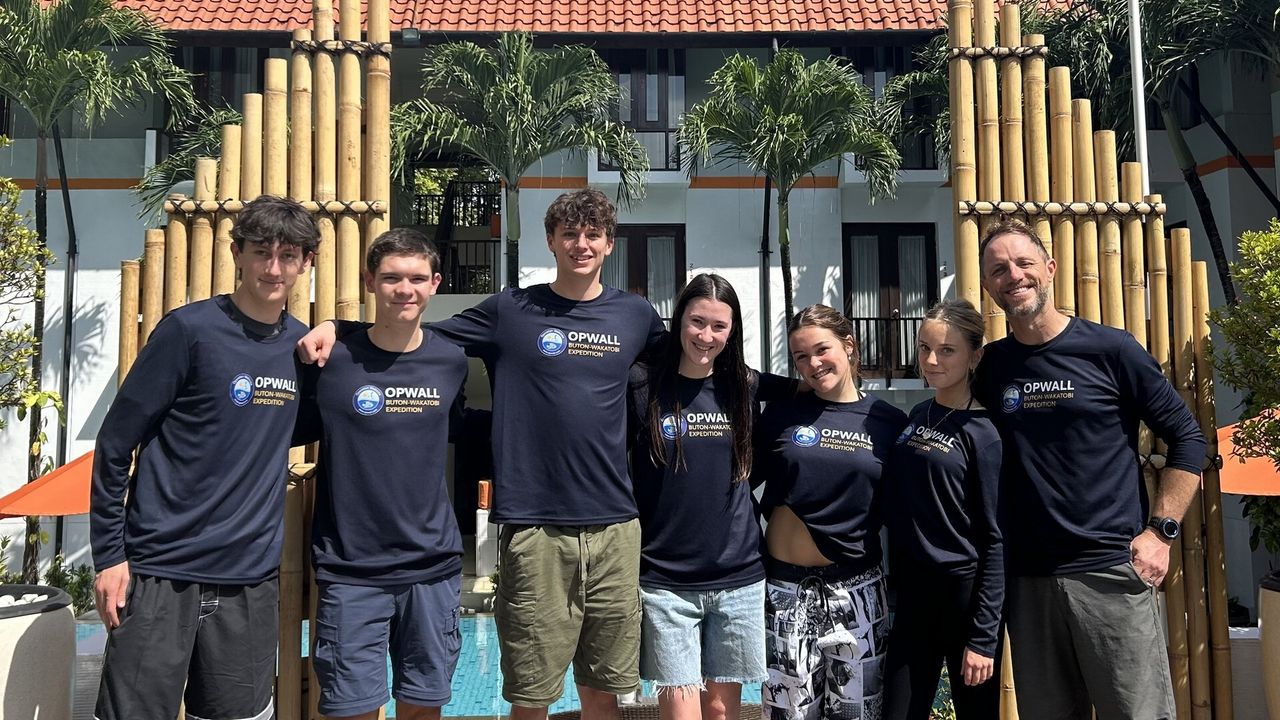Into the Wild with Operation Wallacea – Sulawesi 2025

By Troy Wegener | Lead Teacher Operation Wallacea - Indonesia Expedition
Destination: Southern Sulawesi, Indonesia
Expedition Partner: Operation Wallacea (Opwall)
By the numbers: 17 days | 6 students | 6 flights | 4 boats | 5 hotels | Infinite memories

At 2:00am on Friday 27th June, bleary-eyed and wide-smiled, six brave students — Josiah Britton, Zoe Palmer, Indie Speirs, Amelie Grivell, Daniel Sue, and Tom Loiterton — gathered at Adelaide Airport. For some, this was their first time venturing beyond Australia’s shores. By day two, after threading our way through Denpasar and Makassar, we touched down in Kendari, ready for what lay ahead — an adventure of epic proportions.
Jungle Chronicles – Buton Island
The first leg took us deep into the wild heart of North Buton – Camp Anoa: five hours by boat, one hour bouncing in the back of a truck, and a final 45-minute trek through thick rainforest and across seven river crossings (yes, seven!) before we arrived at camp. The destination? A dense, thriving forest like no other — home to the elusive Muna-Buton macaque, the haunting whoosh of the red-knobbed hornbill’s wings, and more endemic species than you can imagine.
Here, the students worked side-by-side with international scientists in real-world conservation: surveying habitats, identifying bird calls at dawn, stalking butterflies with nets, recording amphibian species, and trying to catch a glimpse of Sulawesi’s most elusive larger megafauna... the anoa. The data they helped collect contributes to peer-reviewed research that has already shaped over 200 scientific papers — a fact that left us in quiet awe as we scribbled in field notebooks beneath a canopy of stars.
Ocean Adventures – Hoga Island
From rainforest to reef — the next chapter was Hoga Island, nestled in the heart of the Wakatobi Marine National Park, part of the Coral Triangle, Earth’s most biodiverse marine region.
Reaching Hoga was a journey in itself: a short drive, followed by two separate boat trips — but the reward was worth every wave. A laid-back paradise of white sand, salt-crusted dive gear, and open-air classrooms surrounded by turquoise water.
Over six magical days, students undertook a reef ecology course, learned coral identification, and explored how marine biologists conduct underwater transects. Two students even earned their PADI Open Water Dive certifications, allowing them to glide beside reef fish, nudibranchs, and coral bommies that pulsed with life. The benthic world they studied in the morning was brought vividly to life by afternoon dives — biology meets wonder, face to face.
The final night at each camp was “social night” — a celebration of connection. Students, local guides, international staff, and villagers gathered for feasts of traditional food, traditional music, and dancing beneath the stars. Language barriers melted away. Feet stomped. Laughter echoed through the forest and across the reef. These were more than goodbyes — they were promises to return.
On Day 16, as we retraced our steps back to Makassar, the mood shifted. Tired, yes. But changed. Something had taken root.
What makes this expedition truly remarkable isn't just the biodiversity or the science — it's the human connection. Our students didn’t just learn about conservation; they saw how it works when science is community-powered. They watched local people — once loggers and coconut farmers — now working as forest rangers, research guides, dive support, and eco-tourism leaders, thanks to a 20-year partnership with Opwall.
They saw what it means to live in balance with nature, not in opposition to it.
We returned home with muddy boots, sun-kissed faces, and hearts full of gratitude — for the scientists who mentored us, the communities who welcomed us, and each other. This was no ordinary school trip. It was an expedition — a journey into the unknown, where learning came alive and the world felt both vast and intimately connected.
Thank you, Opwall. Thank you, Indonesia. Until next time — Terima kasih.
Transit Gallery
Terrestrial Gallery
Marine Gallery
Video Highlights

Encounter Lutheran College acknowledges the Ramindjeri people of the Ngarrindjeri Country as the Traditional Custodians of the land on which we live, work and learn. We pay our respects to Elders past, present and emerging.
Contact Encounter Lutheran College

